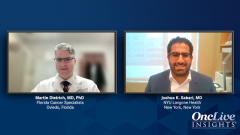
KRAS G12C–Mutated NSCLC: Real-World Implications of Novel Targeted Therapy
Closing out their review of treatment options for KRAS G12C–mutated NSCLC, expert oncologists look toward future utilization of novel targeted agents in this setting.
Episodes in this series

Transcript:
Joshua K. Sabari, MD: Curious Martin, now that these drugs hopefully will be approved in the near future; sotorasib FDA approved, adagrasib going to be approved in mid-December of this year in the second-line. How do you then think about moving these agents to the frontline setting in our current patient population? We talked earlier, chemo-IO or IO alone, are these drugs combinable with immunotherapy and if so, how?
Martin Dietrich, MD, PhD: We've seen some concerns with sotorasib about the combination opportunity with immunotherapy and we don't really know whether this is a dose-dependent concern, or whether this is truly a drug-related hypersensitivity in the liver that gets exacerbated; the concern here is mainly hepatotoxicity. We're hoping that, and there's obviously also work on the sotorasib dosing, and that this may be alleviated by going to the 240 milligrams of dosing. We're seeing these side-by-side comparisons in clinical trials and in our experience, there's not a big difference, in fact most of our patients have been treated at doses that are below the 960 milligrams. I'm hopeful for this, but I do think it has a very logical concept of combinability where we see a non-immunosuppressive therapy that is static and holds a patient in a clinical status where this would be combinable with immunotherapy, plus the durable effect of immunotherapy for which we need certainly some time for it to take full effect. I do think this is a very appealing option and would not only apply to a different set of patients, but maybe even have better responses to immunotherapy because we're missing out on the immunotherapy induced immunosuppression. I'm very excited about this, moving this in the frontline setting and replacing chemotherapy and maybe even offering a platinum-doublet in a second-line setting with a different immunotherapy backbone. This might be a very interesting partner for adagrasib we have some data that is moving in this direction. That this may be an option, it may become available more quickly. In my opinion, a better way of managing short-term disease stabilization than chemotherapy. How this is going to shake out in head-to-head trials, we'll have to see. But certainly, the concept of combining, and for the first time combining a target therapy plus an immunotherapy with an expectation of response is truly exciting. As you know, in EGFR and ALK we've done these combination trials and had very limited success and some of the worst failures, so KRAS certainly opening up a different level where we have both immunotherapy and a target therapy as an offering for patients, which is very exciting.
Joshua K. Sabari, MD: Whether this is an immune-mediated toxicity or whether this is a class effect from these medications, or maybe some of the KRAS G12C inhibitors are different. We saw data, as you mentioned, from sotorasib with the toxicity and combination, and even from a French group of just looking at the utilization of sotorasib post-PD1, PD-L1 inhibitor. We have some data, but we need further data for adagrasib and other G12C inhibitors in this space before I feel confident that these can be safely combined. What an exciting time, these are the first generation of KRAS G12C inhibitors that's the starting point. Martin, I think we can only get better here for our patients. And with that, I want to thank you for joining us in listening to Approaches to Treatment of Non-Small-Cell Lung Cancer Harboring KRAS G12C Mutations. And Dr Dietrich, again, thank you so much for a phenomenal discussion today. It's always a pleasure.
Martin Dietrich, MD, PhD: I appreciate you. Thank you so much for leading it.
Transcript edited for clarity.





































